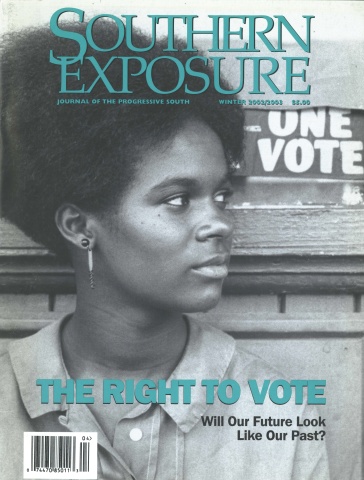Election Investigation: How to Conduct a Citizen Audit of Your Election Board

This article first appeared in Southern Exposure Vol. 30 No. 4, "The Right to Vote." Find more from that issue here.
“All politics is local.” This adage is especially true for voting systems, particularly in the South, where authority and funding are usually handed to counties and local jurisdictions. While this has often led to a disjointed patchwork of election systems and procedures, it also means that everyday citizens can have an enormous say in shaping voting policy.
Before pushing for change, you’ll want to get armed with the facts by performing a “citizen’s audit” of your election board.
Start by setting up an appointment with the board’s ranking staff person. Let her/him know what information you’d like at the meeting. Remember, the relationship doesn’t have to be adversarial —it’s a collaboration that benefits everyone. If you encounter resistance, that itself is instructive, and you should bring to the meeting a copy of your state’s open records law (available on the web). Here’s a starter list of information to request:
• A copy of the election board budget;
• A list of election board members, the director, and the staff, with their job descriptions and salaries (election workers and officials are often woefully underpaid);
• The most recent precinct map of the county;
• A sample ballot;
• A sample printout of the voter database, with at least 200 names in sequence. Citizens are allowed to have copies of the voter database, although there may be a fee.
Once the actual meeting begins, allow the director to give your group an orientation, which will often answer a number of questions. Afterwards, be sure to inquire about the following:
• What kind of voting equipment is your county using?
• How is it maintained?
• Is there enough of the equipment to deal with breakdowns in the course of the election?
• Are enough ballots printed for every election for every registered voter in the county?
• What are the most common errors that result in a ballot not being counted?
• How are poll workers trained?
• Are there provisional ballots? Does every poll worker know about provisional ballots?
• What were the “undercounts” for each precinct in the last election? (“Undercounts” are uncounted ballots. Your county or state may not have this data, which itself is valuable information.)
• How many changes have resulted from redistricting (if applicable)?
• What is the procedure to notify voters of changes?
• Is your county already using a statewide database system for its voter records?
• If so, how has it worked, and does the county have adequate technology to maintain that system correctly? If not, why not?
• A very important question for the director is: What has been your biggest frustration about this job? (This is often a thankless and underpaid position; interestingly, a disproportionate share of election board directors are women.)
• Finally, how might a group like yours assist in making the next election a success?
The information you collect from these and other questions will be critical to working with the board to identify problems and solutions. Your next step is to gather the information, find patterns, and develop an agenda of what needs to change, and how. Again, in an ideal situation, this can be done in tandem with the election board staff themselves, who are often looking for citizen allies to help their cause.
Armed with this information, you can now approach the appropriate legislative body — usually the county commission — with your findings, showing the problems and outlining appropriate solutions.
For a more complete list of questions to ask election boards and other information on a Citizens’ Audit, visit the Southern Voting Rights Project at www.southernstudies.org or call (919) 419-8311 x25.
Tags
Stan Goff
Stan Goff is an associate of the Institute's Southern Voting Rights Project (2003)
Chris Kromm
Chris Kromm is executive director of the Institute for Southern Studies and publisher of the Institute's online magazine, Facing South.
